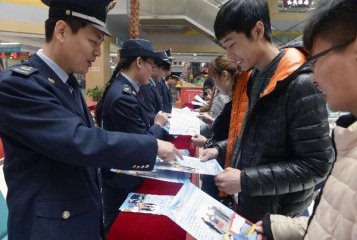
The value-added tax (VAT) for 23 products, including agricultural products and natural gas, will decrease from 13 percent to 11 percent
The Economic Information Daily learnt from the State Administration of Taxation (SAT) on June 19 that policies on the VAT rate will come into effect on July 1. The VAT rate for 23 products, including agricultural products, natural gas, edible salt and books, will decrease from 13 percent to 11 percent. Enterprises for deep processing of agricultural products at a rate of 17 percent will maintain the previous preferential policies to prevent more tax burdens.
“The policy will directly reduce the tax burdens of taxpayers.” Based on preliminary calculation, the policy will benefit 25,000 taxpayers in wholesale and retail industries in Guangzhou and is expected to reduce 501 million yuan of tax burdens, indicated a responsible person from the Guangzhou Municipal Office of the SAT. It will boost enterprises in expanding development and further boost economic growth.
“The tax rate for the sale of gas will decrease from 13 percent to 11 percent. The company will save about 500,000 yuan of VAT this year.” A financial officer from a Guangzhou-based gas company indicated. The lower rate will reduce the cost of basic necessities. “The cut of the VAT rate from 13 percent to 11 percent will reduce a tax of about 14 million yuan each year,” indicated Zhuang Chuanshan, financial manager of CNOOC Shenzhen branch.
Insiders pointed out that upper-stream enterprises will see fewer tax burdens at a VAT rate of 11 percent in the long run. Down-stream enterprises can deduct at 13 percent and the tax burdens will remain unchanged. As upper-stream enterprises reduce prices, down-stream enterprises will spend fewer in purchasing raw materials.
Cao Yingcai, legal representative of Guangzhou Dongxing Agricultural Product and By-product Processing Company, which is engaged in simple processing and wholesales of agricultural products like nut fruits, showed his welcome to the new policy. “The new policy cancels the 13 percent VAT rate. The 11 tax rate will be adopted to the goods which are applicable to the previous 13 percent VAT rate before. The company’s revenue is predicted to reach 15 million yuan in the second half of 2017. Thanks to this policy, substituted money on VAT will reduce by 300,000 yuan when compared with that before the tax rates are adjusted.”
Likoufu under Guangzhou Restaurant, as a downstream enterprise buying commodities from Guangzhou Dongxing Agricultural Product and By-product Processing Company, will also benefit from the policy. The company’s CFO Zhou Xinghong said that the company is expected to purchase 3 million yuan of nut products from Guangzhou Dongxing Agricultural Product and By-product Processing Company in the second half of the year. According to the new policy, substituted money on VAT will reach 330,000 yuan, down by 60,000 yuan. Likoufu enjoys a deduction of 330,000 yuan, but the deduction can reach 390,000 yuan if based on the 13 percent tax rate. Therefore, there’s potential for bargaining due to decline in tax burden of upstream enterprises.
Jiang Zhen, a researcher at the National Academy of Economics Strategy at Chinese Academy of Social Sciences told the reporter that simplifying and combining the VAT rates is a measure of deepening tax reform following replacement of business tax with VAT. Simplifying the tax rates can reduce VAT’s influence on value chain during the transaction process, strengthen tax neutrality, equity on tax system and market equity, optimize investment and operation structure of real enterprises, and meets the decisive function of market in resource allocation.
Industry insiders pointed out that the value-added tax regime will be simplified by combining four tax rates into three, which can eliminate many problems arising from the reform of replacing business tax with VAT and relieve tax costs and burdens of enterprises. It also meets the demand of being in line with international tax system and creates conditions for China to speed up legalization on VAT.
It is learnt that besides simplifying and combining the tax rates, the policy of replacing business tax with VAT is being improved continuously. “Optimization specific to demand of taxpayers will be made, which will be a highlight of deepening replacement of business tax with VAT in 2017.” Lin Feng, deputy head of Goods and Services Tax Department with the State Administration of Taxation, introduced that another 10 new measures specific to difficult problems that taxpayers focus on will be launched. From June 1 on, the pilot of small-scale taxpayers issuing special invoice on VAT by themselves is expanded from hotel industry and authentication and consulting industry to building industry. The small-scale taxpayers with monthly sales revenues exceeding 30,000 yuan are allowed to issue invoices on their own through the new VAT invoice management system when providing construction services and selling goods.
Translated by Star Zhang



















Latest comments